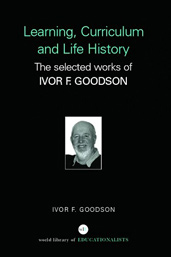Learning, Curriculum and Life Politics: the selected works of Ivor F. Goodson
On Curriculum Form
The third central dichotomy concerns the passive response of the lower orders to experience and knowledge compared with the active use of the upper ranks. This spectrum of passivity to activity is perhaps the most crucial part of the conundrum of mentalities when related to the evolution of school knowledge. Hence
The sensually-based, superficial and simple thoughts of the lower orders did not allow them to produce mediated responses to experience, or to make deep connections between different pieces of information, such as would permit them to be generalised for use as resources in a wide range of contexts (Smith, quote in Shapin and Barnes 1976, p.234).
From these early stages the link between the lower orders and specific, contextualised knowledge was forged. This need for immediate contextualised knowledge provided the diagnosis “which justified the characterisation of their learning process as passive and mechanical” (Shapin and Barnes 1976, p.234). Knowledge was presented and accepted in a way that connections were not made between specific and contextualised facts, the lower orders did not act upon knowledge or generalise from data. A devil's bargain emerged: the lower order were taught specific, contextualised ‘facts’ mechanically - the capacity to generalise across contexts was not provided or encouraged. Decontextualized knowledge was for others then - for the lower orders it became a deeply alien and untouchable form of knowledge. In due course it too ensured passivity.
In contrast the upper orders could incorporate their perceptions, intuitions, information and knowledge into coherent systems of thought and inference.
By so doing, they could, on the one hand, extend their range of applicability, and, on the other, bring a range of abstract principles and symbolic operations to bear upon them. Thus, they could, unlike the lower orders, make active use of knowledge and experience. Whatever it was, it served to extend the possibilities of their thought.
Hence:
In society, as in the body, the head was reflective, manipulative and controlling; the hand, unreflective, mechanical, determined by instructions (Smith, quote in Shapin and Barnes 1976, p.235).
